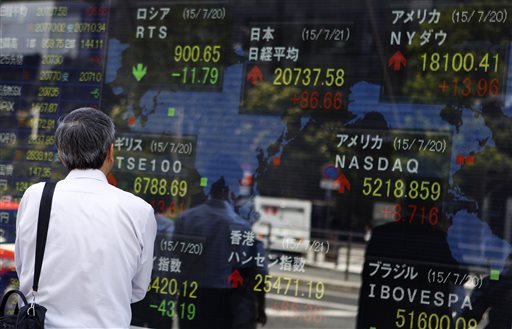Asian shares rise but commodities struggle

A man looks at an electronic stock board displaying global stock indexes, including Japan’s Nikkei 225 index, top center, in Tokyo, Tuesday, July 21, 2015. Most Asian stock markets were modestly higher Tuesday after positive US earnings reports boosted sentiment. AP PHOTO/KEN ARAGAKI
HONG KONG–Asian markets advanced Tuesday, with Tokyo boosted by a weaker yen and Shanghai’s recovery continuing, but falling commodity prices fueled fears about global growth.
With concerns easing about the Greek debt crisis and China’s market rout, dealers are now focusing on when the US Federal Reserve will raise interest rates as the US economy gets back on track.
Tokyo rose 0.93 percent, or 191.05 points, to 20,841.97–close to an 18-year high–and Sydney climbed for a sixth straight session, putting on 0.35 percent, or 19.8 points, to 5,706.7. Seoul gained 0.50 percent, or 10.31 points, to 2,083.62.
Shanghai closed up 0.64 percent, or 25.56 points, at 4,017.67–ending above the key 4,000 point barrier for the first time since July 1.
Hong Kong added 0.52 percent, or 131.62 points, to 25,536.43.
Buying was also supported by another positive lead from Wall Street, where the Nasdaq Monday ended at a record high for the third straight session, adding 0.17 percent.
The Dow gained 0.08 percent and the S&P 500 finished 0.08 percent higher, just short of an all-time high.
On currency markets the dollar hit a five-week high against the yen as investors position for a rate rise widely expected in either September or December.
Last week Fed chief Janet Yellen said she saw a rise before 2016.
At the same time the Bank of Japan and European Central Bank are spending hundreds of billions of dollars on bonds and other assets to support their respective economies, pushing down the value of the yen and euro.
The dollar bought 124.43 yen Tuesday against 124.30 yen in New York.
The euro bought $1.0825 and 134.61 yen, little changed from $1.0824 and 134.55 yen in US trading.
“The weaker yen and cheaper oil will have a positive effect on Japanese stocks,” said Toshihiko Matsuno, chief strategist at SMBC Friend Securities Co. in Tokyo.
Shanghai rally
Chinese shares have risen more than 14 percent since hitting a low on July 8. The decline forced Beijing to introduce a raft of measures to staunch a month-long plunge that saw the Shanghai index fall by about a third, wiping trillions off valuations.
Among the measures were a police crackdown on short-selling and a ban on big shareholders and company executives from selling stock for six months.
“The 4,000 level is a key battlefield for bulls and bears,” said Li Jingyuan, general manager of the securities investment department at Shanghai Zhaoyi Asset Management. He added that once the level is breached traders feel more confident to carry on buying.
However, dealers said there are fears that a fall in commodities prices underlines weakness in the global economy.
Gold fetched $1,108.55 an ounce after falling to as low as $1,072 Monday, its weakest since 2010. The precious metal had been at $1,144.00 late Friday but has taken a hit owing to the US rate rise talk, which has seen investors rush into the dollar looking for better returns.
And on oil markets US benchmark West Texas Intermediate for August delivery fell 20 cents to $49.95 a barrel, while Brent crude for September dropped 14 cents to $56.51 in afternoon trade.
“This commodities rout is a very big concern,” Michael McCarthy, a chief strategist at CMC Markets in Sydney, told Bloomberg News.
“There’s risk for a further downside. It looks like the overall global growth outlook is continuing to slow.”
Investors were also keeping an eye on Greece where the government raised taxes and paid billions of euros to its creditors on Monday, as banks reopened just days after the debt-laden country reached a bailout deal with its creditors.
In other markets:
— Taipei gained 0.34 percent, or 30.96 points, to 9,005.96.
Taiwan Semiconductor Manufacturing Co. rose 1.08 percent to Tw$140.5 while MediaTek gained 3.03 percent to Tw$357.0.
— Wellington added 0.26 percent, or 14.98 points, to 5,876.91.
Spark was up 1.03 percent at NZ$2.935 while Warehouse Group was steady at NZ$2.61.
— Manila closed 1.15 percent, or 86.79 points, higher at 7,627.96.
Mall operator SM Prime Holdings rose 1.90 percent to 21.40 pesos, Ayala Land was up 1.32 percent at 38.50 pesos and Banco de Oro jumped 1.45 percent to 105 pesos.
— Singapore was flat, edging down 2.07 points to 3,371.41.
Property firm City Developments fell 0.50 percent to Sg$9.90 and OCBC Bank dipped 0.39 percent to Sg$10.36.
— Kuala Lumpur rose 0.70 percent, or 12.06 points, to 1,736.19
Tenaga Nasional gained 0.33 percent to 12.32 ringgit, Sime Darby added 0.81 percent to 8.68 ringgit and AMMB Holdings fell 0.86 percent to 5.78 ringgit.
— Bangkok dropped 1.31 percent, or 19.27 points, to 1,447.44.
Kasikorn Bank fell 3.46 percent to 181.50 baht and oil company PTT lost 2.42 percent to 322 baht.
— Mumbai fell 0.84 percent, or 237.98 points, to end at 28,182.14 points.
Sun Pharmaceutical Industries fell 14.95 percent to 805.30 rupees, while IT major Infosys gained 11.05 percent to 1,112.65 rupees.
— Jakarta was closed for a public holiday.